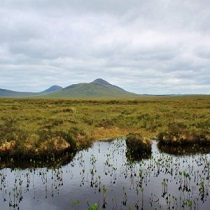Carbon, Water, and Climate
Carbon, Water, and Climate
The Highlands and Islands of Scotland are home to a range of diverse wild habitats with unique biodiversity attributes, many of which represent the last remnants of pristine environments left within the UK. In their natural state, they play critical roles in the regulation of water and in the local, regional and global regulation of climate, through sequestration and storage of carbon.
We will characterise the species and processes behind those ecosystem services, and understand how they will respond to anthropogenic disturbances and changes in climate.
Peatlands in a changing world. The ERI’s CWC team supports field-based research in the Flow Country peatlands and coordinates of the Flow Country Research Hub. We also work on the development of novel tools for assessment of peatland condition combining remote sensing approaches and empirical data collection.
Organic matter from source to sink. With our research, we aim to understand the fate of OM as it leaves the terrestrial pools and enters the freshwater rivers and estuaries on its way to the ocean, by combining field sampling and analytical chemistry
Ocean fluxes. We collaborate on research that seeks to improve estimates of GHG emissions from the oceans using remote sensing technology.
Peatlands
Peatlands cover a third of Scotland’s land area, more than any country in Western Europe. Caithness and Sutherland is home to the “Flow Coutry”, the largest expanse of blanket bog in the world… right on ERI’s doorstep!
With an estimated 400 MT of carbon stored in the peat, it is also the single largest terrestrial carbon store in the UK. But peatlands are not important only for their disproportionate capacity to store carbon, they also support unique species, some of international biodiversity importance, and they play a central part in water regulation in many upland catchments. They are directly connected to the marine environment by a network of fast flowing rivers, providing an ideal set up to link processes “from source to sink”.
Conserving, protecting and restoring peatland is a global priority that the ERI’s research aims to inform. This is made possible in part by the Flow Country Research Hub, a network of researchers and practitioners coordinated by the ERI.
The Flow Country Research Hub
The Flow Country Research Hub is a network of researchers and stakeholders interested by peatland research in the Flow Country, the vast expanse of blanket bog spreading across Caithness and Sutherland in the North of Scotland. It was launched during the first Flow Country Research Conference, held in Thurso in October 2012.
The Flow Country Research Hub aims to establish the Flow Country as a UK focal point of peatland science addressing contemporary issues such as climate change, biodiversity, resource management and sustainability.
The ERI acts as a coordinator and produces a quarterly newsletter circulated widely and a twitter account: both are used to promote communication between the different groups involved in the research projects in the Flow Country.
A wide range of peatland research projects are taking place in the Flow Country, most of which are collaborative in nature. This in in line with the long-term aspiration of the network, which are to:
– Provide and maintain infrastructures which promote international collaborations, student placements, visiting researchers and which enable sustainable, world-class research to take place in the Flow Country;
– Improve the integration between scientists, landowners, practitioners, governance bodies and policy makers, to help deliver restoration objectives in Scotland;
– Develop a better platform for the provision of outreach and knowledge exchange activities making research accessible to all
